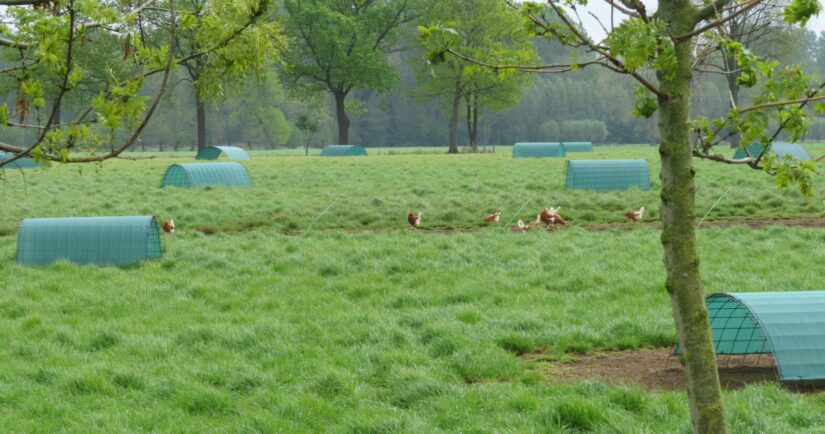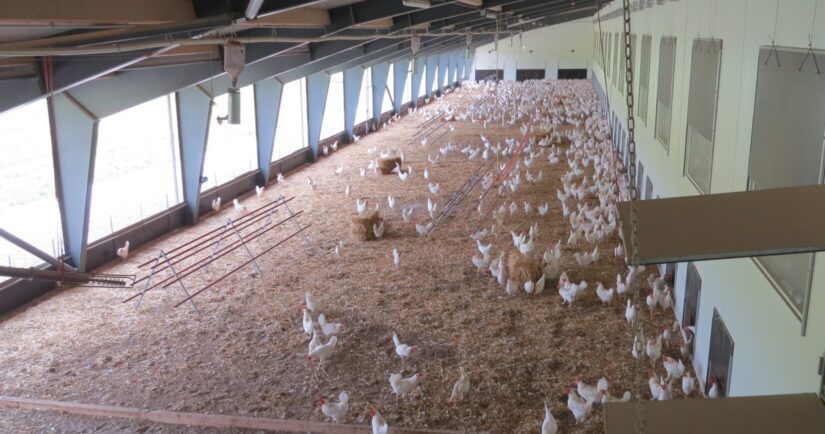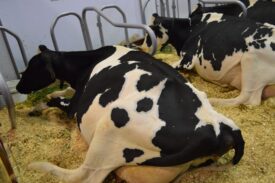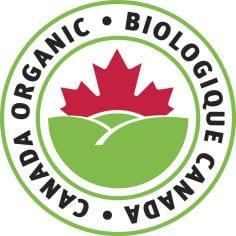Have you bought organic food thinking that the animals raised on these farms lived a better life? If you answered yes, you are correct! Farmers who raise animals for organic food must meet high animal welfare standards.
These standards, outlined in the Canadian Organic Standards (COS), are reviewed and updated every five years. This ensures the standards reflect new research and society’s expectations of organic production. The most recent revision of the COS, which began in 2018, is now complete. BC SPCA staff earned a spot on the committee that reviews the standards, and were a strong voice for animal welfare.
Organic food was already a good choice for protecting farm animal welfare for many reasons. These include providing outdoor access, more space, and independent farm inspections. These are not requirements for conventional farms. With this update, the BC SPCA is happy to see that even more improvements were made.
Below are some highlights of the new COS that will improve the lives of farm animals on organic farms across the country.
Chicken and turkey welfare
There were significant improvements to bird welfare in the 2020 COS.
Outdoor shade and protection
The barn is a safe space for birds. Venturing outside can be intimidating due to threats from predators such as hawks. Birds are less likely to go outside and make use of the outdoor space if there is no overhead cover or safe places to hide.

New in the 2020 COS, outdoor areas must have shade and protection from predators so the birds feel safe exploring the full outdoor area. Time outdoors provides many animal welfare benefits. They can explore an enriching environment, express natural behaviours like foraging and dust-bathing, and exercise.
Enriched verandahs – laying hens
Also new in the 2020 COS, barn-raised laying hens must have access to an enriched verandah whenever they can’t go outside. This could be due to bad weather or risk of disease exposure.

An enriched verandah is a covered, uninsulated, unheated extension to a barn. Enriched verandahs provide the benefits of the outdoors, but offer protection from bad weather, predators and disease. The floor must be sand, dirt or a solid floor covered with bedding. These materials provide comfort, warmth and encourage foraging, scratching and dust-bathing. Allowing hens to perform these natural behaviours significantly improves their welfare.
The enriched verandahs also provide many environmental enrichments for the birds. Examples include hanging objects for pecking at and platforms for perching on or hiding under.
Other animal welfare improvements
- Dehorning is no longer permitted. Dehorning is a painful practice that removes the horns of an animal after they have begun to grow. It is now only permitted if essential for the welfare of the animal, and pain control must be used.
- Tie-stalls will be phased out of organic dairy production by December 2030.

Dairy cows in a tie-stall dairy barn. In the meantime, if tie-stalls are in use, dairy cows must have an exercise period at least twice a week, preferably every day. Tie-stalls confine cows to individual stalls, and are unable to walk around freely. This puts them at risk of becoming lame. The move from tie-stalls to loose group housing is a major improvement in the COS. We hope the National Farm Animal Care Council’s (NFACC) Code of Practice for the Care and Handling of Dairy Cattle, which sets minimum standards for all dairy farms in Canada, follows this lead and phases out tie-stalls as well.
- Outdoor exercise areas for pigs improved. They must have shaded/sheltered areas so the animals can take cover during poor weather. When made of concrete (rather than pasture or dirt), outdoor exercise areas must also have a bedded area for pigs to rest.
- Perches for laying hens must be designed to satisfy their natural perching behaviours. You may be surprised to learn that hens have clear preferences when it comes to perching. Think of a perch like a chair – some are definitely more comfortable than others.
- Space requirements for sheep and goats have increased, giving animals more room both indoors and outdoors.
Can I trust the organic label?
Organic farms have to meet higher standards than the minimum required in Canada (NFACC’s Codes of Practice). Organic farms are also inspected by an independent third-party to ensure the standards are being met. This means that you as a consumer can trust that organic farms are meeting these higher standards. Unfortunately, there is no independent, third-party monitoring program to ensure farms are meeting the minimum welfare standards set out by the Codes of Practice.
What am I paying for?
Higher-welfare food, such as organic, is more expensive to buy because it is more expensive to produce. Providing extra space, enrichments and maintaining outdoor areas, for example, costs more. But you can be confident that your money is being put towards providing animals with a life worth living.
The BC SPCA is committed to improving the welfare standards for animals living on all farms in Canada, including organic farms. We look forward to advocating for more animal welfare protection at the next COS update.
More resources:
Subscribe to FarmSense newsletter
FarmSense is delivered four times a year and includes news about farm animal welfare, and updates on what the BC SPCA is doing to help improve the lives of farm animals in Canada.
